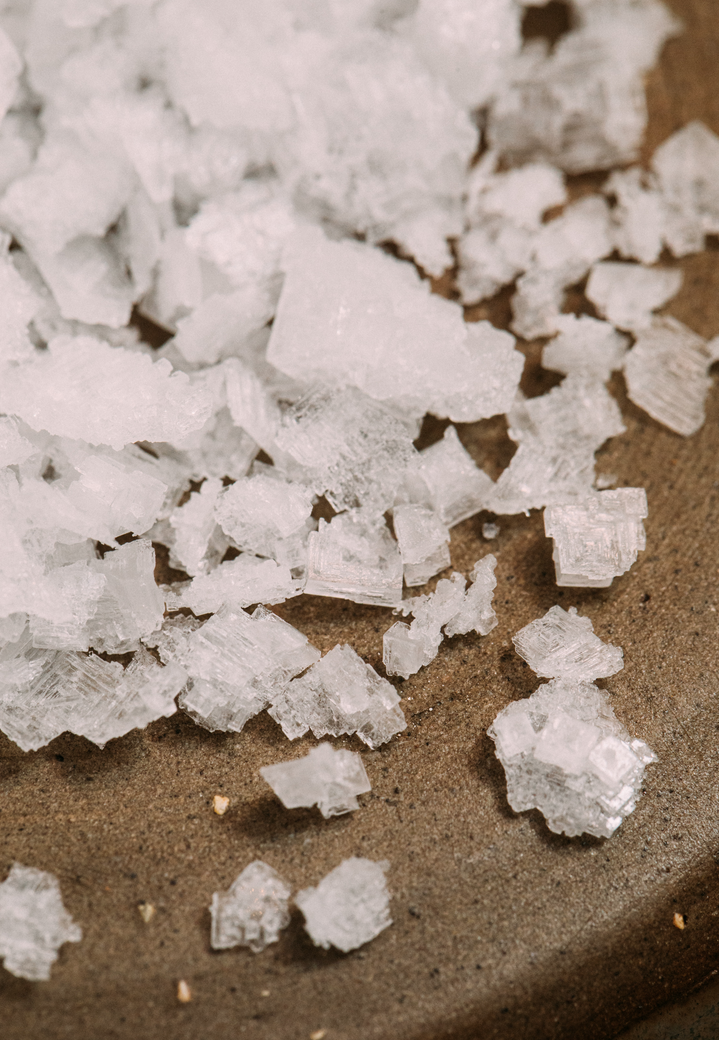Mark 9:42-50, from the Question Mark series of talks?
Everyone will be salted with fire; salt is good but if it loses its saltiness how can you make it salty again? Have salt in yourselves and be at peace with each other (v49-50).
1. Salt?
Salt can lose its flavour!
 Our key question this morning is: can salt which has lost its flavour be made salty again? Jesus is at it again, challenging his hearers to visualise a surprising situation. Can a camel go through the eye of a needle? We might say today, can pigs fly? A striking image.
Our key question this morning is: can salt which has lost its flavour be made salty again? Jesus is at it again, challenging his hearers to visualise a surprising situation. Can a camel go through the eye of a needle? We might say today, can pigs fly? A striking image.
My dad was a Vicar in North Devon and he had a big font in his church. It was so big that it took a significant amount of water to fill it, and you could totally immerse the baby being christened. Of course the baby did not always appreciate that experience!
In ancient times, salt was used as an antiseptic, and so new born babes were washed in salted water. If they did not have salt, they used camel's urine! Another striking image! Of course salt was also used as a preservative in hot countries where food would quickly go off, and dead bodies would quickly stink. They even used it to confirm a deal by eating food together, sharing salt to flavour the food, which still happens today in some places.
But salt in Jesus' day was different from the kind you find on shelves today. It was very impure so it could end up losing its preserving and antiseptic properties. However, if it lost its saltiness, it was fit only to be dumped onto roads (Matt 5:13). It was simply useless! So what was Jesus on about?
2. Being a Disciple?
Following Jesus costs us everything.
Here in Mark chapter 9 we have a number of sayings and teachings of Jesus which relate together gathered in one place. The feel of this part of Mark's gospel is a bit bumpy, with changes of subject which don't all seem to fit together. But once you realise it’s all about discipleship it becomes a little clearer. We can begin to piece the sections together, like a patchwork quilt or the pieces of a broken pot.
So what is going on here? What does it tell us about discipleship?
- discipleship is about nurturing the faith of others, helping them to continue in their life of following Jesus and becoming like Jesus (9:42ff). Be careful not to impede others' walk with God, or to be the reason they get off track. It would be better if you had a grinding stone attached to a rope round your neck, and you were flung into the sea, than to have to explain that to Jesus when you meet him
N.B. little ones here is not children so much as people who believe in Jesus (little ones who believe in me). In other words ordinary men and women who are trying to follow the way of the cross, like you and me.
- discipleship is making sure you keep on track: if your hand or your foot or your eye is causing you to sin, then get rid of them because it’s more important to keep going as a disciple. Cut it off, cut it off, gouge it out – in other words, it is really important to stay on track as a disciple, to keep going and not to let anything else get in the way of you growing closer to Jesus and becoming more like him. There are lots of things, both good and bad, which might prevent us from continuing in our life of faith.
- discipleship is about focusing on life: you don't want to end up in a bad place do you? Gehenna was a valley where there had been child sacrifice, and when that stopped it became a dumping ground for rubbish and rotting flesh on the south side of Jerusalem. Jesus is using it to say, life without God is like this – smelly, rotten and a place where the fires never stops burning. No one in their right minds would swap that for life. And that life can be experienced here and now, says Jesus. I have come that you may have life and have it to the full (John 10:10).
And then we come to the salt again (9:49-50): but this time it’s about how salt was used in worship.
Every sacrifice made by the people of God was to include salt, sprinkled on top (Leviticus 2:13). The whole of the sacrifice was to be burned up as a pleasing aroma to God.
- So finally, discipleship will cost you everything. As we follow Christ the sacrifices we make (to follow him) purify us, make us useful to God, holy for him.
Justin Welby the ABC previously had a promising career in the oil industry. After 11 years he gave it all up to train for the priesthood, and now he serves the church as ABC, a hugely costly role. But for some of you the change is no less dramatic. Your first call is to follow Christ.
3. Being Disciples?
Jesus calls us to follow him together
The final part of our gospel reading talks about us having salt in ourselves and being at peace with one another. These last 2 verses of chapter 9 are difficult ones, but what Jesus seems to be saying is this: as you follow the way of Christ sacrificially, setting aside what is good but that gets in the way of your discipleship, nurturing the faith of those round you and walking with them the road of faith focused on the life that Christ offers now and in the future, then you will be drawn together in peace.
The church (the group of disciples in this place) will then be a place that is attractive to others because it is Christ centred, not me-centred.
The diocesan strategic priorities are about what we as a diocese think we should be focussing on at this time. They aren't always easy to understand, but then they were written by more than 200 people – a horse designed by committee is a camel (the 2nd time a camel has appeared in this sermon!). Each parish or benefice has been asked to see what part they can play in helping these SPs develop and bear fruit. And today yours is going “live”, it's starting and what a great adventure that will be.
If you want this church community to grow in number, then you need to guard your relationships. How you treat one another really does matter. If you focus on what you want, rather than what is best for newcomers, then you will spend your time arguing, and people will notice there is no peace. But if you commit to focusing on Christ, to developing as a disciple, to growing more like him then people will be attracted to him at the centre of this church. And your church will grow not just in number, but in depth and engagement. You can really make a difference to this local community.
So, some top tips for you about life in the big brother house, sorry the life of your church:
- keep short accounts – apologise quickly, seek to be reconciled quickly to someone who upset you or whom you upset.
- Assume the best when people speak – don't assume they are being difficult.
- Treat everyone with grace knowing that life sometimes makes us grumpy and short-tempered.
We are called to journey together as disciples of Christ. Like my friend who walked the pilgrimage to Santiago de Compostella in the summer – he went with another Christian friend, in this case his wife! We really do need one another alongside us, but rooting for us and encouraging us on, just as the Holy Spirit walks with us too.
So can salt be made salty again?
My answer is yes! Remember the baptism promises you made, or were made for you until confirmation?
- Do you turn to Christ? Do you realise you need help?
- Do you repent of your sins? Are you sorry and have you turned away from those areas that tripped you up?
- Do you renounce evil? Are you ready to give up what is stopping you from following Christ more closely?
As we use these questions and responses, as we turn, repent and renounce, God meets us by his Holy Spirit and regenerates us from within. The only question is whether we are willing to be re-salted!
Amen
Reverend Phil Dykes, in St John the Evangelist, Hook. 27th September 2015
